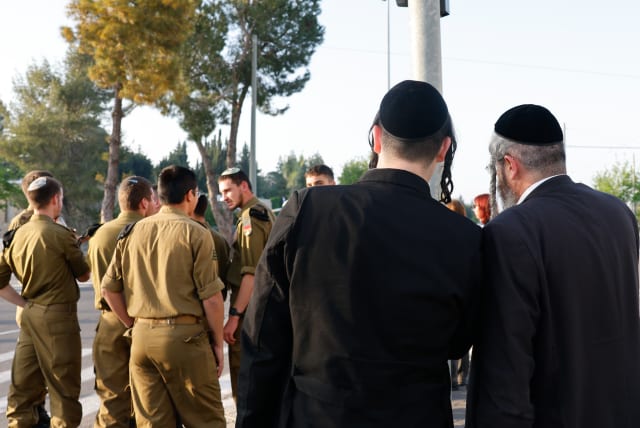The haredi-IDF train wreck continues to inch along - analysis

Whether the government will fall, manage to stay aloft while continuing to drag out the issue, or whether a compromise will miraculously be reached, remains up in the air.
A train wreck is when everything falls apart in the messiest way possible.What do you get when the train wreck manages to chug along, mess dragging all around?That would be the attempts to resolve IDF-haredim issue.
The ultra-Orthodox are the only consistent player in this drama.They oppose integration into the IDF.
Here and then, some of their leaders, especially from the Shas side of Arye Deri, will flash possibilities of compromise if the pressure drops and there is more dialogue, but really their position has barely changed even after October 7.
Remarkably, UTJ faction head Yitzhak Goldknopf on Sunday spoke at a celebration of Bnei Brak’s 100 years just as 12 soldiers were laid to rest and made a number of statements showing how disconnected he feels the two realities are.
He did this while strangely protesting that he was only speaking to express solidarity with the soldiers, but there was no sense of a readiness to compromise.The weakest player in this performance has been the High Court of Justice.For around seven years in a narrow sense, and for decades in a wider sense, it has stuck its head in the sand and ignored the obvious inequality of avoiding drafting haredim, hoping (in vain) that the political class would eventually resolve the issue.
Suspension of funds
In late March, the High Court finally suspended one-third of some of the government-sponsored funds for the around 1,750 haredi yeshivot. But this did not impact the vast majority of the over 60,000 haredim in play for IDF or national service, only a portion of the recent draft class.It also did not impact significant non-government funds that the haredi institutions raised.Though some haredi advocates present the reduction in funds as being a life and death issue, if it truly were, they would have cut a new compromise deal by now for increasing draft numbers, even if not as high as some parties want.Just two weeks ago, the High Court held a follow-up hearing to see if the government had progressed on the issue.The government did not even fake having progressed and merely spoke about the potential of some kind of a future resolution.And yet a shift has come over the court. A distinct aspect of the June hearing was that three of the most conservative voices – Justices Noam Sohlberg, Alex Stein, and Yael Wilner – were among the roughest and most aggressive critics of the government.Sohlberg was furious that the IDF has offered as a minimum initial measure to take in 3,000 haredim out of over 60,000 eligible draftees over the course of the 2024 recruitment class, and that the government even refused this.Incidentally, their strong stance is probably also part of a shift of the country’s religious-Zionist public from tolerating the haredi exemption as a curious annoyance of political allies, to being ready to campaign for haredim to do more now that so many fallen soldiers are religious Zionists.Prime Minister Benjamin Netanyahu has shape-shifted on this issue more times than one can count, though following the basic principle of wanting to appear as if he is pressing the haredim to change, while in practice making sure to gum up the works of any progress so as to mollify the haredim.National Unity party leader Benny Gantz has shape-shifted as well.Although Gantz has talked passionately about the need for more haredi service in the IDF due to October 7, Netanyahu’s move offered as a solution the exact bill that Gantz proposed in 2022 as defense minister, did expose how much Gantz has altered course.In 2022, he was ready to endorse haredi national service with very little of a real influx into the IDF.Defense Minister Yoav Gallant entertained giving the haredim their desired exemption as recently as mid-2023, as long as those who served in the IDF would get an increase in wages and benefits.Now he too is demanding much higher haredi numbers joining the IDF.The IDF is now saying it needs huge volumes of haredim, but in the past and even in some legal statements, it continues to acknowledge that it has limits in how many haredim it can absorb at once – with 3,000 being the current number.As of August, the High Court can take away even more haredi funds if the issue is unresolved.The court may even issue a new ruling creating more pressure any day now.On the other hand, the court may let Knesset Foreign Affairs and Defense Committee Chairman Yuli Edelstein have a month or so to thread the needle of reaching a compromise.But one way or another the issue is coming to another climax in the next month or two.Whether the government will fall, manage to stay aloft while continuing to drag out the issue, or whether a compromise will miraculously be reached, remains up in the air.Yet, short of an unexpected grand compromise, the ongoing dragged-out train wreck will continue to tear apart aspects of the Israeli political and social landscape.
Jerusalem Post Store
`; document.getElementById("linkPremium").innerHTML = cont; var divWithLink = document.getElementById("premium-link"); if (divWithLink !== null && divWithLink !== 'undefined') { divWithLink.style.border = "solid 1px #cb0f3e"; divWithLink.style.textAlign = "center"; divWithLink.style.marginBottom = "15px"; divWithLink.style.marginTop = "15px"; divWithLink.style.width = "100%"; divWithLink.style.backgroundColor = "#122952"; divWithLink.style.color = "#ffffff"; divWithLink.style.lineHeight = "1.5"; } } (function (v, i) { });

